Golden chance for Vietnam firms to boost links with Australia’s Northern Territory
The time is right for Vietnamese businesses to promote trade and investment cooperation with Australia in general and its Northern Territory in particular.
The time is right for Vietnamese businesses to promote trade and investment cooperation with Australia in general and its Northern Territory in particular.
Need to capture opportunity
Ties between Vietnam's Association of Foreign Invested Enterprises (VAFIE) and Australia's Northern Territory received a kick-start back in 2022 when the association and the Northern Territory-Vietnam Business Council (NTVBC) co-organized a conference in Ho Chi Minh City.
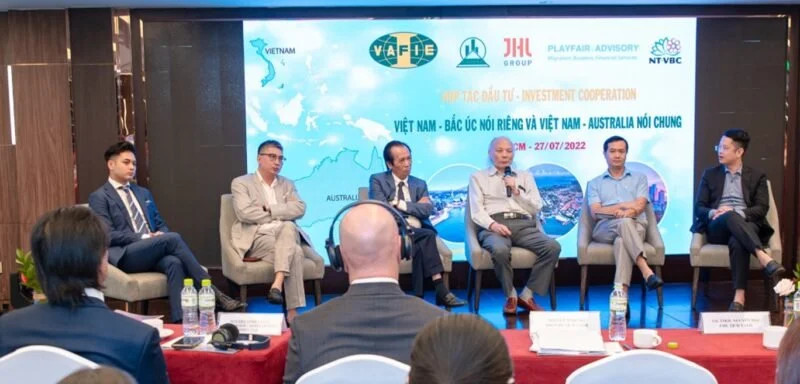
The Vietnam's Association of Foreign Invested Enterprises (VAFIE) coordinates with the Northern Territory-Vietnam Business Council (NTVBC) in organizing a conference on investment cooperation between Vietnam and the Northern Territory in particular and Vietnam-Australia in general on July 27, 2022. Photo courtesy of VAFIE.
The event was attended by representatives of the Ministry of Planning and Investment, the Ministry of Labor, Invalids and Social Affairs, the Australian Consulate General in HCMC, AusCham in Vietnam, the Northern Territory Government, and the NTVBC, along with nearly 100 businesses and investors involved in construction, tourism and agricultural products.
VAFIE chairman Prof. Nguyen Mai said the Northern Territory is a land full of potential that needs to be tapped and Vietnamese businesses should take advantage of this unprecedented opportunity to promote trade and investment cooperation with Australia in general and the Northern Territory in particular.
"VAFIE has asked the Prime Minister to form a strategy for trade and investment cooperation between Vietnam and the Northern Territory to enhance Vietnam-Australia economic links," the professor said.
Nguyen Ngoc My, vice chairman of VAFIE and chairman of Vabis Group, a pioneer in researching and promoting a series of trade and investment cooperation activities between Vietnam and the Northern Territory since 2013 said that with recent world trends, Vietnamese businesses have great advantages to invest in Australia through the Northern Territory gateway.
"Recently, the Northern Territory Government issued the Northern Territory International Engagement Strategy 2022-2026, in which Vietnam is named among the top six priority countries for trade and investment cooperation," he said.
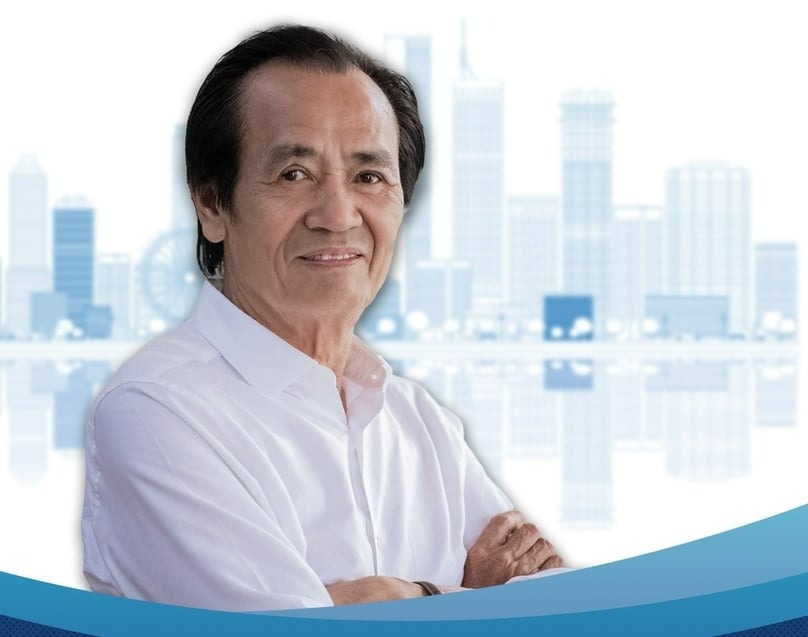
Nguyen Ngoc My, vice chairman of the Vietnam Association of Foreign Invested Enterprises (VAFIE) and chairman of the Northern Territory-Vietnam Business Council (NTVBC). Photo by The Investor/Trong Hieu.
According to My, in order to serve the needs of businesses and investors interested in learning about investment in the Northern Territory and Australia, VAFIE plans to hold business trips to explore the market and seek business partners, in combination with golf tours, with scheduled departures at the end of each month.
Investment opportunities
According to Mai, Australia is an advanced, internationally connected economy, opening up opportunities for Vietnam to access a democratic, rule-of-law political institution with highly effective state management.
In particular, the financial system operates sophisticatedly and closely, the economy is stable, and the business sector is highly competitive and globally integrated, he said, adding that Australia has a multicultural society, with many investment opportunities, an open market, wealth, high technology, a skilled and highly qualified workforce, a world-class innovative system, and a transparent and effective management mechanism.
He noted that more and more Vietnamese businesses in different fields are participating in trade activities with Australia, including multinational manufacturers located in Vietnam, corporations owned by Vietnam, small- and medium-sized enterprises (SMEs), and entrepreneurs.
Vietnam has a dynamic and growing relationship with Australia, so Vietnamese businesses are looking to Australia to diversify import sources and export markets, increase investment, strengthen supply chains, and develop new trade areas, bringing benefits to both economies.
"Vietnam and Australia have jointly announced the Enhanced Economic Engagement Strategy (EEES), which is being implemented to promote two-way trade and investment, in the context of the two countries celebrating 50 years of diplomatic relations," Mai said.
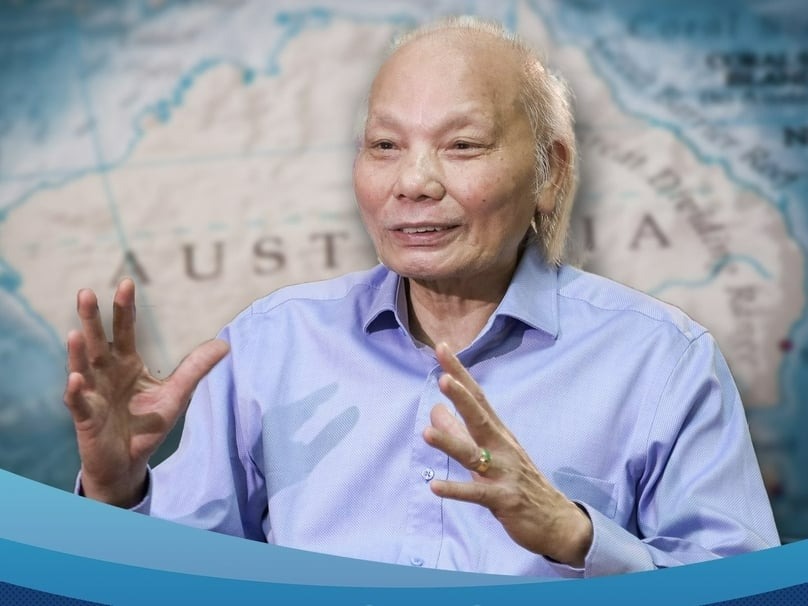
Prof. Dr. Nguyen Mai, chairman of the Vietnam's Association of Foreign Invested Enterprises (VAFIE). Photo by The Investor/Trong Hieu.
Vietnamese firms can increase exports of seafood, tropical fruits and organic products, as well as electronics, garments and footwear, household appliances, processed foods and beverages. The minerals and energy, including renewable energy, digital services, distribution, travel, and tourism services are also calling out for investment.
Mai stated that the two economies complement one another and form the basis for bilateral trade and cross-border value chains across the region. Vietnamese manufacturing businesses should take advantage of Australia's high quality raw materials and processed metals to produce goods sold in Vietnam and exported.
Australian businesses have exploited finished products and input materials from Vietnam, including machinery and equipment, textiles-garments, and furniture, which are consumed in Australia or exported to other countries, he added.
He held that goods exported from Vietnam are not only essential inputs for economic activities in Australia, but part of the value of these goods that contributes to improving the competitiveness of finished products from Australia and vice versa. Participation in cross-border value chains allows both economies to prosper from each other's success.
Investment activities from Vietnam in Australia show the high reciprocity between the Australian economy and Vietnam's export ability, he said, noting this investment process not only supports the development of Vietnam's economy and its export manufacturing industries, but also facilitates key export sectors and economic activity in Australia.
The VAFIE leader further stated that the flow of direct investment from Vietnam to Australia reflects the mutual strengths between the Australian economy and Vietnam's export ability. Compared to FDI flows from other countries to Vietnam, the investment from Vietnam to foreign countries is smaller, but there has been a remarkable rise.
Innovation links have been expanded through development aid packages and government-sponsored activities. There are cases of successful cooperation between Vietnamese businesses and Australian research organizations, but the potential for increased cooperation remains huge.
Leading lights
Major Vietnamese businesses investing in Australia.
TH Group
TH Group, Vietnam's third largest producer of milk and dairy products, established a subsidiary in Australia in 2019 called Clean Agriculture and International Tourism (CAIT), and spent AUD130 million ($85 million) buying three cattle farms in Argyle and Auvergne in the Northern Territory, and Newry in Western Australia.
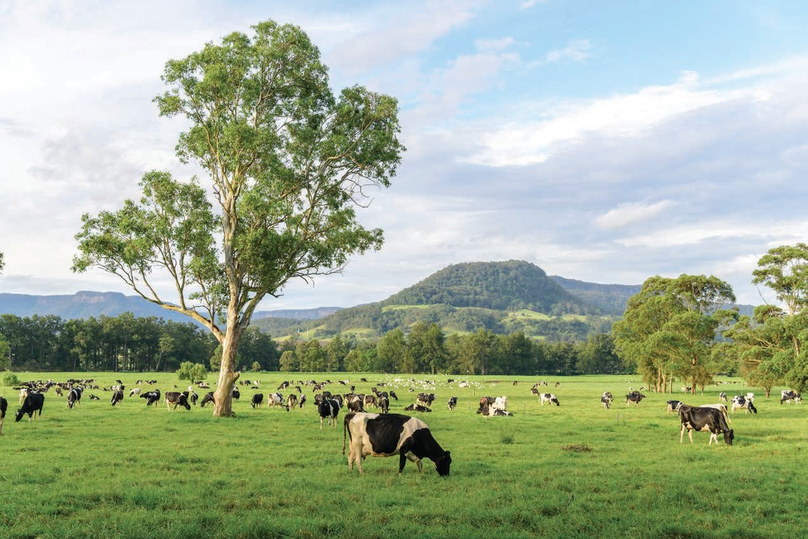
A cow farm in Australia. Photo courtesy of Johnny Greig.
The purchase agreement included more than 732,900 hectares of land and 58,000 livestock. Since then, TH Group has invested an additional AUD8.5 million ($5.56 million) to upgrade pastures, infrastructure and management systems.
This investment is the group's second project outside Vietnam, following a dairy production project in Russia. A new business was born successfully thanks to the group's investment capital and experience in farming and raising livestock on an industrial scale, combined with the expertise of the local Australian staff. Currently, CAIT exports 15,000 head of cattle annually to Vietnam, China and Indonesia.
Australia's agricultural strengths, assets, currency value and stability were the primary factors that attracted the attention of TH Group, as well as its relatively close proximity to Vietnam.
TH Group plans to optimize production to raise 90,000 cattle, and tap crop and tourism potential. Its investment has received support from government agencies, including the Vietnamese Embassy, the Australian Trade and Investment Commission (Austrade), and state governments.
Both Western Australia and the Northern Territory have provided advice and support for TH Group's investment, demonstrating the important role of the agricultural sector in production, employment, and exports.
Vingroup
In 2016, Vingroup - the largest and most diverse corporation in Vietnam, used AUD22.5 million ($14.7 million) to buy land in downtown Sydney to build a hotel and luxury goods stores.
Also that year, its subsidiaries sought fresh opportunities in Australia. Within the framework of the Vingroup Science and Technology Scholarship Program for Overseas Study for Master's and Doctoral Degrees, the group has sponsored students of its VinUni to achieve postgraduate degrees from leading universities in Australia in medical and biomedical field, advanced wireless systems, agricultural robotics, and Internet of Things.

The VF 6 car model produced by VinFast. Photo courtesy of VinFast.
Planning to sponsor and host the Formula 1 Grand Prix in Vietnam, Vingroup set up a relationship with Melbourne, which has been the organizer of the F1 Grand Prix in Australia since 2016.
In 2015, VinFast, a subsidiary of Vingroup, with the ambition of manufacturing Vietnamese smart electric vehicles for export to the world market, recruited Australian automobile engineers and managers after an Australian auto assembler closed its last line.
The Covid-19 pandemic interrupted VinFast’s plan to utilize talent, expertise and equipment in Victoria.
Vinsmart, another subsidiary of Vingroup, has been a mobile phone manufacturer since 2018. It was in talks with suppliers for Australian carriers, following an agreement with U.S. firm AT&T to diversify its supply sources, before announcing an end to production in June 2021, but Australia still holds potential for Vingroup in the coming years.
Sovico
Sovico operates across multiple fields, such as finance and banking, real estate, and aviation. It is the parent group of VietJet - Vietnam's second largest airline. In 2019, Sovico opened a representative office in Melbourne, and signed an agreement with Linfox43 to develop operations at Avalon, Victoria's second largest airport.
The two partners said they will collaborate to develop customer services, goods, aviation equipment, and hotel accommodation in Australia, as well as open flights between Vietnam, Melbourne and other destinations in the region.
VietJet has also expressed an interest in Australia because this is a large market for overseas students and citizens travelling for business purposes to both Hanoi and HCMC. There is also increasing potential for charter flights between popular locations in the Asia-Pacific region through HCMC.
VietJet has also cooperated with RMIT, a leading unit in aviation training, to organize pilot training sessions in Melbourne, while RMIT Vietnam provides support for the VietJet Aviation Academy in Ho Chi Minh City.
Hoa Phat Group
Hoa Phat Group (HPG) is a large industrial manufacturing corporation in Vietnam, operating in the fields of iron and steel, agriculture, real estate, and household appliances. As a multi-industry group, HPG has high demand for raw materials for steel and agricultural product production.
Australia is a natural fit for HPG because of its rich natural mineral reserves and favorable geographical location. Over the past few years, trade between HPG and its Australian partners has increased sharply. HPG started importing coal and iron ore from Australia in 2009, and exported its first batch of construction steel to the country in 2015. It and has imported Australian cattle since 2016.
In 2020, HPG expanded steel production, necessitating increased imports of machinery, equipment, and production materials to $2 billion, with about 35% from Australia. HPG alone accounted for 16% of the total export value from Australia to Vietnam in 2020.
The group took the first step on the path to accessing the world's largest iron ore supply market by purchasing the Roper Valley iron ore mine in Australia in June 2021.
Hoa Phat Group has pioneered in the demand for Australian iron ore and coal to expand steel production, with supply agreements signed with leading Australian suppliers. The group is continuing to evaluate the investment potential for ore and coking coal in Australia to exploit at least 10 million tons of iron ore annually. HPG's steel output is expected to reach 14 million tons per year by 2025.
According to HPG's board of directors, the main driving force for its investment in Australia is the ability to find raw material sources needed for long-term production at competitive prices, thereby maintaining stable and continuous production, improving efficiency, and strengthening the value chain of its product ecosystem.
Vietcombank
Vietcombank is one of the four largest state-owned commercial banks in Vietnam. In 2019, it announced its intention to expand operations in Australia, and was licensed by authorities in Vietnam for two years to open a branch in Sydney with a reported charter capital of AUD71 million ($46.42 million) in 2021.
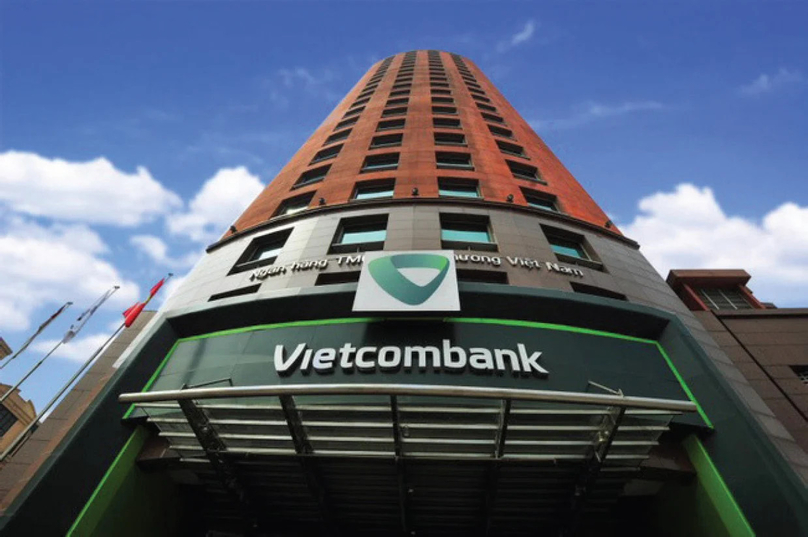
The headquarters of Vietcombank in Hanoi. Photo courtesy of Vietcombank.
This plan created a premise for the opening of its next foreign branch in the U.S. Vietcombank also has representative offices in Southeast Asia.
Increasing investment from Vietnamese businesses in Australia, especially from the Vietnamese-Australian community, provided the incentive for Vietcombank to explore the viable customer base emerging in Australia.
To be successful in Australia:
1. A long-term strategic view rather than focusing on immediate benefits.
2. Adaptability.
3. Newcomers can access information and support from Vietnamese and Australian government agencies to understand the requirements as well as support from business associations, agencies, and chambers of commerce.
4. Recruit local and Australian personnel with experience and skills.
5. Follow regulations - there may be difficulties but businesses need to meet legal requirements for employers, such as those on wages, taxes, insurance, and contributions to pension funds, which are higher than in Vietnam.
6. Set up links with colleagues in Australia to plan an approach to the Australian market, evaluate route-to-market strategy, support commercial cooperation and build the image of the business.
7. Businesses sending goods to Australia can take advantage of connections with the large Vietnamese-Australian community and overseas Vietnamese living and working in Australia, including students.




